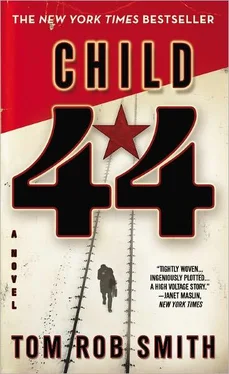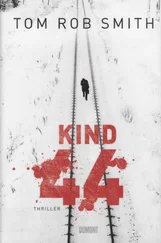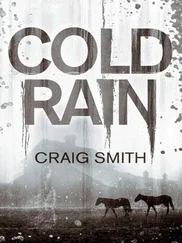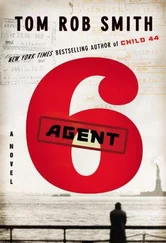One of the men left the room, to return almost immediately holding two small cases.
— This is all you can take. You can carry nothing on your person except your clothes and your papers. In one hour we leave whether you’re ready or not.
Leo stared at the cases, canvas stretched tight over a timber frame. They offered a modest space, enough for a day trip. He turned to his wife.
— Wear as much as you can.
He glanced behind him. One of the officers was watching, smoking.
— Can you wait outside?
— Don’t waste time making requests. The answer to everything is no.
Raisa got changed, sensing this guard’s reptile eyes roaming over her body. She wore as many clothes as she could reasonably manage: layers on top of layers. Leo did the same. It might have been comical, in other circumstances, their limbs swollen by cotton and wool. Dressed, she grappled with the question of what, of all their belongings, they should bring and what they were forced to leave behind. She examined the case. It was no more than ninety centimetres wide, maybe sixty centimetres high and twenty centimetres deep. Their lives had to reduce to fit this space.
Leo knew there was a chance they’d been told to pack merely as a way of being moved without any of the emotional fuss, the struggle which came with the realization that they were being sent to their deaths. It was always easier to move people around if they clung to the notion, no matter how small, that they were going to survive. However, what could he do? Give up? Fight? He made several quick calculations. Precious space had to be wasted with the inclusion of The Book of Propagandists and The Short Course of the Bolshevik Party , neither of which could be abandoned without it being construed as a subversive political gesture. In their current predicament such recklessness was nothing less than suicidal. He grabbed the books, putting them in the case, the first objects either of them had packed. Their young guard was watching everything, seeing what went in, what choices they made. Leo touched Raisa’s arm.
— Take our shoes. Pick the best, one pair each.
Good shoes were rare, tradable, a valuable commodity.
Leo gathered up clothes, items of value, their collection of photos: photos of their wedding, his parents, Stepan and Anna, but none of Raisa’s family. Her parents been killed in the Great Patriotic War, her village wiped out. She’d lost everything except the clothes she’d been wearing. With his case full Leo’s eyes came to rest on the framed newspaper clipping hanging on the wall: the photo of himself, the war hero, the tank destroyer, the liberator of occupied soil. His past made no difference to these guards: with the signing of an arrest warrant every act of heroism and personal sacrifice had been made irrelevant. Leo took the clipping out of the frame. After years of carefully preserving it, revering it on the wall as though it were a holy icon, he folded it down the middle and tossed it in the case.
Their time was up. Leo shut his case. Raisa shut hers. He wondered if they’d ever see this apartment again. It was unlikely.
Escorted downstairs, all five of them crammed into the elevator, pressed together. There was a car waiting. Two of the officers sat in the front. One sat in the back, his breath stinking, sandwiched in between Leo and Raisa.
— I’d like to see my parents. I’d like to say goodbye.
— No fucking requests.
Five in the morning and the departure hall was already busy. There were soldiers, civilian passengers, station workers all orbiting the Trans-Siberian express train. The engine, still clad in armour plating from the war, was embossed on the side with the words HAIL TO COMMUNISM. While passengers boarded the train, Leo and Raisa waited at the end of the platform, holding their cases and flanked by their armed escort. As though they were infected with a contagious virus, no one approached them, an isolated bubble in a crowded station. They’d been given no explanation, nor did Leo bother asking for one. He had no idea where they were going or who they were waiting for. There was still a chance they’d be sent to different Gulags, never to see each other again. However, this was unmistakably a passenger train, not the zak cars, the red cattle trucks used to transport prisoners. Was it possible they were going to escape with their lives? There was no doubt that they’d been lucky so far. They were still alive, still together, more than Leo had dared to hope for.
After Leo’s testimony he’d been sent home, placed under house arrest until a decision could be made. He’d expected it to take no more than a day. On the way to his apartment, on the fourteenth-floor landing, aware that he still had the incriminating hollow coin in his pocket, Leo had tossed it over the side. Maybe Vasili had planted it, maybe not, it no longer mattered. When Raisa had arrived back from school she’d found two armed officers outside their door; she’d been searched and ordered to remain inside. Leo had explained their predicament: the allegations against her, his own investigation and his denial of the charges. He hadn’t needed to explain that their chances of survival were slim. As he’d talked she’d listened without comment or question, expressionless. When he’d finished her response had taken him by surprise.
— It was naive to think this wouldn’t happen to us too.
They’d sat in their apartment, expecting the MGB to come at any minute. Neither of them had bothered to cook; neither of them had been hungry even though the sensible thing to do would’ve been to eat as much as possible in preparation for what might lay ahead. They hadn’t got undressed for bed, they hadn’t moved from the kitchen table. They’d sat in silence — waiting. Considering they might never see each other again Leo had felt an urge to talk to his wife: to say things that needed to be said. But he’d been unable to formulate what they might be. As the hours passed he’d realized this was the most time they’d spent together, face to face, uninterrupted, for as long as he could remember. Neither of them had known what to do with it.
The knock on the door hadn’t come that night. Four in the morning had passed, there’d been no arrest. As it had approached midday the following day, Leo made breakfast, wondering why they were taking so long. When the first knock on the door finally came, he and Raisa had stood up, breathing fast, expecting this to be the end, the arrival of officers collecting them, splitting them apart and taking them to their separate interrogations. Instead it was some trivial matter: a changing of the guards, an officer using their bathroom, questions about buying food. Perhaps they couldn’t find any evidence, perhaps they’d be cleared and the case against them would collapse. Leo had only flirted with these thoughts briefly: accusations never collapsed through lack of proof. All the same, a day became two days, two days became four days.
A week into their confinement, a guard had entered the apartment, ashen-faced. Seeing him, Leo had been certain their time had finally come, only to listen as the guard announced, in a voice trembling with emotion, that their Leader, Stalin, was dead. Only at this moment did Leo allow himself to contemplate whether or not they might just have a chance of surviving.
Able to gather the vaguest details of their Leader’s demise — the newspapers had been hysterical, the guards hysterical — all Leo could piece together was that Stalin had died peacefully in his bed. His last words had purportedly been about their great country and their great country’s future. Leo didn’t believe it for a second, too schooled in paranoia and plot not to see the cracks in the story. He knew from his work that Stalin had recently arrested the country’s foremost doctors, doctors who had spent their entire working lives keeping him well, as part of a purge of prominent Jewish figures. It struck him as no coincidence that Stalin had died of apparently natural causes at a time when there were no expert medical professionals to identify the source of his sudden illness. Morality aside, the great Leader’s purge had been a tactical error. It had left him exposed. Leo had no idea whether Stalin had been murdered or not. With the doctors locked up that certainly gave any would-be assassins a free hand to do as they pleased, which was to sit back and watch him die, safe in the knowledge that the very men and women who could stop them were behind bars. Having said that, it was just as possible that Stalin had fallen ill and no one dared contradict his orders and release the doctors. If Stalin had recovered they might have been executed for disobedience.
Читать дальше












